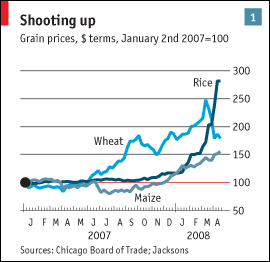Food is a National Security Issue
By Holly Noonan

I'm not Hurting! It just takes $1,000 to buy bread is all!
If you haven't read Michael Pollan's
October 9th Open
Letter to the Next President in the
New York Times, I can't recommend it more highly.
Turn to this article, click on it. Slide through its length. Come back
here. This champion of food
writers, a man who has been one of the great heroes of illuminating the
unfortunate realities of
our food supply through his book The Omnivore's Dilemma (and many other
books and
articles) will actually be in Maine tomorrow night, speaking at Bates College.
(I'm gutted I
can't be there. I found out about it too late.)
Michael Pollan finally says it outright: "Food is a National Security issue."
He notes that more
than 30 nations have experienced food riots because of shortages in the
past several months,
and one government (Haiti) has fallen. He makes the point so clearly
as to be unmistakable, that
our policies up to now which have encouraged massive flows of cheap, subsidized
commodity
grain to flow unencumbered across global free-trade zones, has been a mistake.
The results of
this oil-dependent, unsustainable, non-local food supply system is that
the poorest on our planet
are starving right now.

"Food Prices Soar-- The Economist graphic"
As this article from the Economist notes, "Last year wheat prices rose
77% and rice 16%
(see chart 1). These were some of the sharpest rises in food prices ever.
But this year the speed
of change has accelerated. Since January, rice prices have soared 141%;
the price of one variety
of wheat shot up 25% in a day." (NOTE 6 mos later, today it's even WORSE!
NOV 08)
Josette Sheeran, the head of the UN's World Food Programme, the largest
distributor of food aid,
said recently;
"For those on $2 a day, it means cutting out meat and taking the children
out of
school. For those on $1 a day, it means cutting out meat and vegetables
and
eating only cereals. And for those on 50 cents a day, it means total disaster.”
There are 1 billion of us who live on $1 a day or less and 1.5 billion
more who live on $2
to $1 a day. That's 2.5 billion people our of 6.7 billion-- 37% of the
whole population of the
planet. This doesn't even count the people in this country and other parts
of the developed world
who are hungry. The higher food prices here at home have been painful for
us, yes, but the huge
number of hungry people on the planet can be severely politically destabilizing,
especially when
this issue is superimposed, as it is, on global economic and environmental
crises.
Michael Pollan's article offers some stellar suggestions on how to turn
this situation around,
domestically and globally. His main thesis this that we need to radically
shift our current
oil-dependent agriculture habits (fertilizing, harvesting, shipping, processing)
to sun-based habits
that were employed for the many millennia preceding World War Two. It was
only then, 60+
years ago, that we adopted these unsustainable habits.
It was not THAT long ago. My dad's lifetime. Everything my dad ate as a
child was organic,
because pesticides were only invented at the end of WWII, when they need
a peacetime purpose
for chemical weapons. All prior soil fertility came from the age-old system
of crop rotation and
animal waste. All farms were polycultures, with animals AND vegetables
doing their symbiotic
thing. Most food sheds were regional and local. The US food policy over
the last 60 years has
lead precisely to the current disaster. It was a MISTAKE to encourage farmers
to "get big or get
out" and "plant fence row to fence row," to subsidize farmers to grow commodity
crops that now
end up as processed food for our overweight consumers. It seemed like a
good idea, but it was
not long ago that we started on this path, and it's time to admit the error
and get the hell off it.
Yes, change takes time but we are motivated like never before! It's not
just the potential (and
actual) political turmoil that is fueling (no pun intended) the turnaround.
The second area of
food-as-national-security-issue that Michael Pollan didn't entirely elucidate
is that when our
citizens consume themselves into a stupor on industrial commodity foods,
it's hard to be on the
cutting edge of anything.
In William Dufty's classic, Sugar Blues, he recounts how there was a German
botanist, Leonhard
Rauwolf, who travelled in 1573 through the heart of the Ottoman empire--
the first human
civilization to really get a taste for cane sugar in a big way. Rauwolf
wrote, "The Turks accustom
themselves to gluttony and are no more so free and courageous to go against
their enemies to
fight as they had been in former ages." Dufty goes on to speculate about
the role that sugar
played in the decline of the Arab Empire.

Notice how recent that was: 435 years ago. We haven't had sugar for very
long. In fact, Dufty
goes on recount how empires after the Ottoman rose and fell on the sugar
trade; first went
Portugal and Spain (the Arabs left sugar cane behind when they left Iberia
to the Europeans.)
The sugar trade started with massive profits and then imploded for each
of those Iberian
monarchies, not unlike the sugar high and low we are all familiar with
after a good binge. Next
came Britain. Now it's us.
In 1700, the average
American consumed 4 pounds of sugar per year and now the average
is 170 pounds per American per year (14 pounds a month per person!
HEY it's stats, you can't argue with them. Though I'll suggest that
somebody else is eating my share!) We are now using ourselves to
gluttony. The reasons are many fold, a combination of personal
responsibility and policy that favors the food industry over the health
of our citizens, but the result is the same. Our food is undermining our
ability to be sharp, to think clearly and to forge our destiny. This is
also a matter of national security.
Michael Pollan again; "You cannot expect to reform the health care system,
much less expand
coverage, without confronting the public-health catastrophe that is the
modern American diet." In
fact, he continues, "unless you (make the reform of the entire food system
one of the highest
priorities,) you will not be able to make significant progress on the health
care crisis, energy
independence or climate change."
This is big. Food is huge. We underestimate its importance to our future
at our peril.
<==== BACK
TO
THE FUTURE INDEX PAGE


